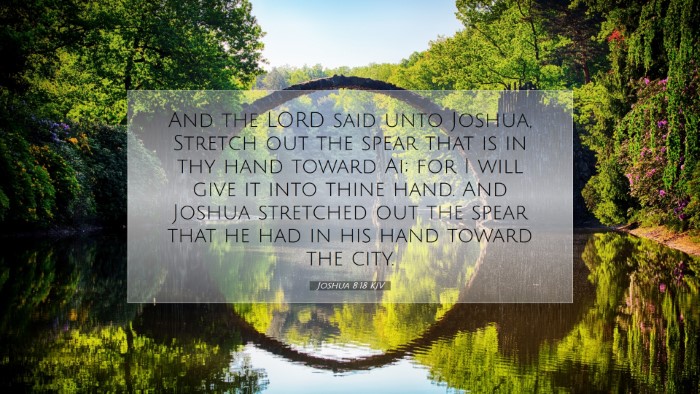Commentary on Joshua 8:18
Joshua 8:18 states: "And the LORD said unto Joshua, Stretch out the spear that is in thy hand toward Ai; for I will give it into thine hand."
General Overview
This verse appears during a significant moment in the conquest of Canaan, capturing God's direct command to Joshua to stretch out his spear as a signal of impending victory over Ai. This action symbolizes the divine assurance of Israel's success, mirroring the themes of faith, obedience, and God's providence.
Significance of the Action
Stretching out a spear can be understood as a gesture of authority and command. Just as Moses raised his staff during the battle against Amalek (Exodus 17:11), Joshua is commanded to raise his spear to denote the power of God working through him. This act illustrates the principle that success in spiritual endeavors often hinges upon the acknowledgment of God’s sovereignty and intervention.
Matthew Henry's Insights
Matthew Henry emphasizes that God’s instructions to Joshua underscore that victory is not solely dependent on military strategy or strength. Rather, it is the acknowledgment of God’s presence and command that guarantees success. Henry comments on the significance of Joshua's spear as a symbol of faith: by stretching it out, he shows trust in God’s promise, effectively engaging the divine assurance of triumph over Ai.
Albert Barnes' Commentary
Albert Barnes reflects on the strategic implications of this moment in Israel's military campaigns. He notes that God's directive to use the spear is not arbitrary; the spear's extension represents a claim to the territory and dominion that God has promised to Israel. Barnes elaborates on how this act was both a physical signal to the Israelite troops and a spiritual act of co-participation with God. It highlights the unity between divine action and human response.
Adam Clarke’s Perspective
Adam Clarke provides an analysis of the spear's significance within the broader context of Israel's conquests. He denotes that the spear is a symbol of warfare and divine help. Clarke suggests that God's command for Joshua to use the spear also signifies the faith required to act upon God's promises. Furthermore, it illustrates a critical lesson in reliance on God’s guidance for the tasks before us—a call for leaders to maintain their faith even amidst overwhelming odds.
Theological Reflections
The command to Joshua contains profound theological implications relevant for today’s believers. It teaches the importance of active faith that responds to divine commands, emphasizing reliance on God as the source of victory in challenges. Moreover, it reflects the necessity of obedient action in conjunction with trust in God's promises—a vital reminder for pastors and theologians that ministry and personal challenges require both faith and works.
Practical Applications
- Believers are encouraged to recognize God's leading through obedience to His Word.
- Leaders should exemplify faith through visible actions that align with God's promises.
- This verse affirms the belief that God empowers His people for their tasks, encouraging reliance on His strength.
- It serves as a reminder that spiritual victories often manifest through what we declare in faith.
Conclusion
Joshua 8:18 encapsulates a powerful moment of divine assurance and human obedience. The interplay between Joshua’s actions and God’s command reflects foundational principles of faith, reliance, and active participation in the unfolding of God’s purposes. For pastors and theologians, the exhortation drawn from this passage is clear: victory is found in faith-filled action led by God’s guidance, reaffirming the enduring relevance of Scripture in guiding believers through the complexities of life and ministry.


